Attached files
| file | filename |
|---|---|
| 8-K - FORM 8-K - DTE Electric Co | k50803e8vk.htm |
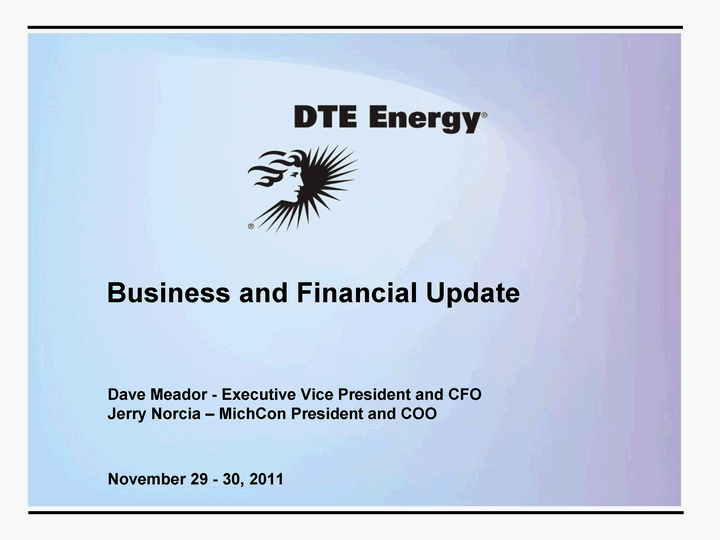
| Dave Meador - Executive Vice President and CFO Jerry Norcia - MichCon President and COO November 29 - 30, 2011 Business and Financial Update |
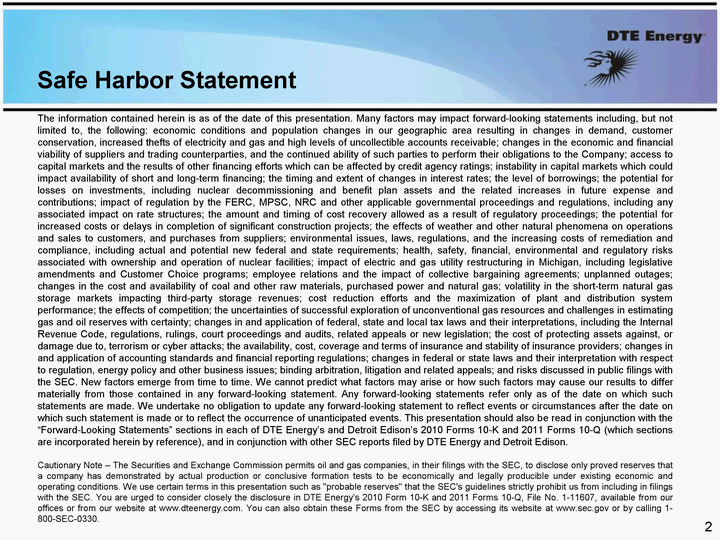
| Safe Harbor Statement The information contained herein is as of the date of this presentation. Many factors may impact forward-looking statements including, but not limited to, the following: economic conditions and population changes in our geographic area resulting in changes in demand, customer conservation, increased thefts of electricity and gas and high levels of uncollectible accounts receivable; changes in the economic and financial viability of suppliers and trading counterparties, and the continued ability of such parties to perform their obligations to the Company; access to capital markets and the results of other financing efforts which can be affected by credit agency ratings; instability in capital markets which could impact availability of short and long-term financing; the timing and extent of changes in interest rates; the level of borrowings; the potential for losses on investments, including nuclear decommissioning and benefit plan assets and the related increases in future expense and contributions; impact of regulation by the FERC, MPSC, NRC and other applicable governmental proceedings and regulations, including any associated impact on rate structures; the amount and timing of cost recovery allowed as a result of regulatory proceedings; the potential for increased costs or delays in completion of significant construction projects; the effects of weather and other natural phenomena on operations and sales to customers, and purchases from suppliers; environmental issues, laws, regulations, and the increasing costs of remediation and compliance, including actual and potential new federal and state requirements; health, safety, financial, environmental and regulatory risks associated with ownership and operation of nuclear facilities; impact of electric and gas utility restructuring in Michigan, including legislative amendments and Customer Choice programs; employee relations and the impact of collective bargaining agreements; unplanned outages; changes in the cost and availability of coal and other raw materials, purchased power and natural gas; volatility in the short-term natural gas storage markets impacting third-party storage revenues; cost reduction efforts and the maximization of plant and distribution system performance; the effects of competition; the uncertainties of successful exploration of unconventional gas resources and challenges in estimating gas and oil reserves with certainty; changes in and application of federal, state and local tax laws and their interpretations, including the Internal Revenue Code, regulations, rulings, court proceedings and audits, related appeals or new legislation; the cost of protecting assets against, or damage due to, terrorism or cyber attacks; the availability, cost, coverage and terms of insurance and stability of insurance providers; changes in and application of accounting standards and financial reporting regulations; changes in federal or state laws and their interpretation with respect to regulation, energy policy and other business issues; binding arbitration, litigation and related appeals; and risks discussed in public filings with the SEC. New factors emerge from time to time. We cannot predict what factors may arise or how such factors may cause our results to differ materially from those contained in any forward-looking statement. Any forward-looking statements refer only as of the date on which such statements are made. We undertake no obligation to update any forward-looking statement to reflect events or circumstances after the date on which such statement is made or to reflect the occurrence of unanticipated events. This presentation should also be read in conjunction with the "Forward-Looking Statements" sections in each of DTE Energy's and Detroit Edison's 2010 Forms 10-K and 2011 Forms 10-Q (which sections are incorporated herein by reference), and in conjunction with other SEC reports filed by DTE Energy and Detroit Edison. Cautionary Note - The Securities and Exchange Commission permits oil and gas companies, in their filings with the SEC, to disclose only proved reserves that a company has demonstrated by actual production or conclusive formation tests to be economically and legally producible under existing economic and operating conditions. We use certain terms in this presentation such as "probable reserves" that the SEC's guidelines strictly prohibit us from including in filings with the SEC. You are urged to consider closely the disclosure in DTE Energy's 2010 Form 10-K and 2011 Forms 10-Q, File No. 1-11607, available from our offices or from our website at www.dteenergy.com. You can also obtain these Forms from the SEC by accessing its website at www.sec.gov or by calling 1- 800-SEC-0330. 2 |
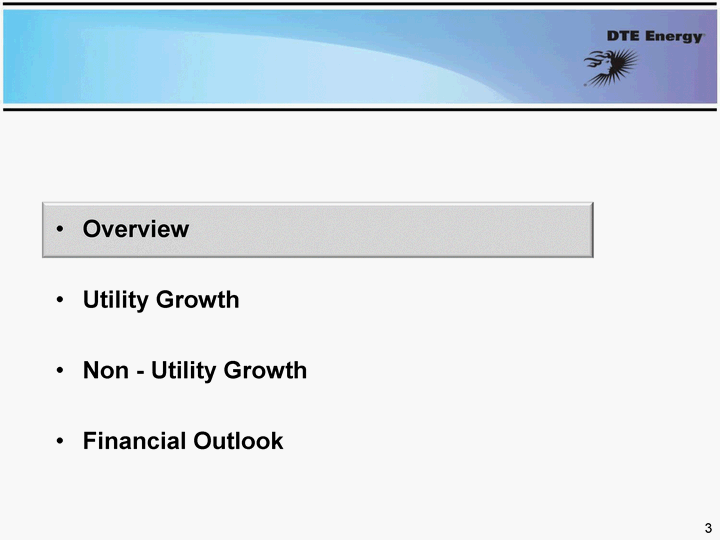
| Overview Utility Growth Non - Utility Growth Financial Outlook 3 |
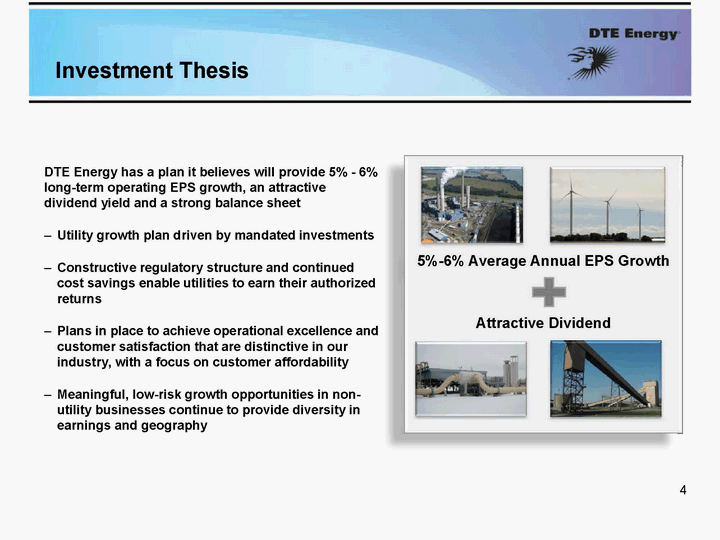
| Investment Thesis DTE Energy has a plan it believes will provide 5% - 6% long-term operating EPS growth, an attractive dividend yield and a strong balance sheet Utility growth plan driven by mandated investments Constructive regulatory structure and continued cost savings enable utilities to earn their authorized returns Plans in place to achieve operational excellence and customer satisfaction that are distinctive in our industry, with a focus on customer affordability Meaningful, low-risk growth opportunities in non- utility businesses continue to provide diversity in earnings and geography 5%-6% Average Annual EPS Growth Attractive Dividend 4 |
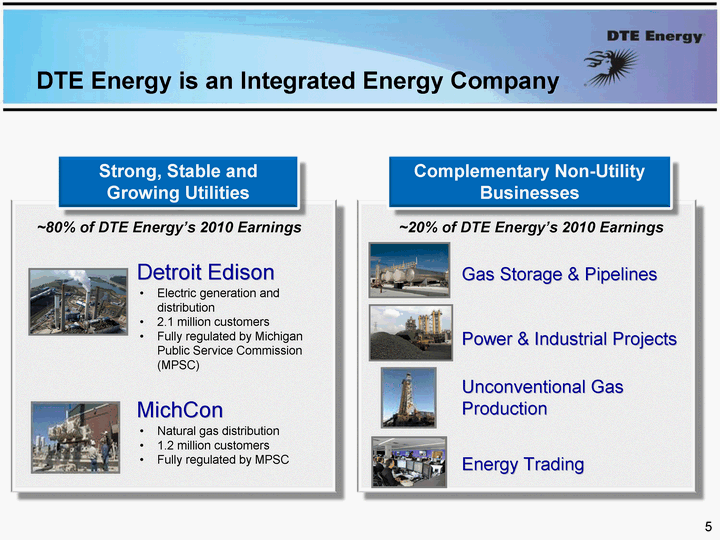
| Gas Storage & Pipelines Power & Industrial Projects Unconventional Gas Production Detroit Edison MichCon DTE Energy is an Integrated Energy Company Complementary Non-Utility Businesses Strong, Stable and Growing Utilities Electric generation and distribution 2.1 million customers Fully regulated by Michigan Public Service Commission (MPSC) Natural gas distribution 1.2 million customers Fully regulated by MPSC Energy Trading ~80% of DTE Energy's 2010 Earnings ~20% of DTE Energy's 2010 Earnings 5 |
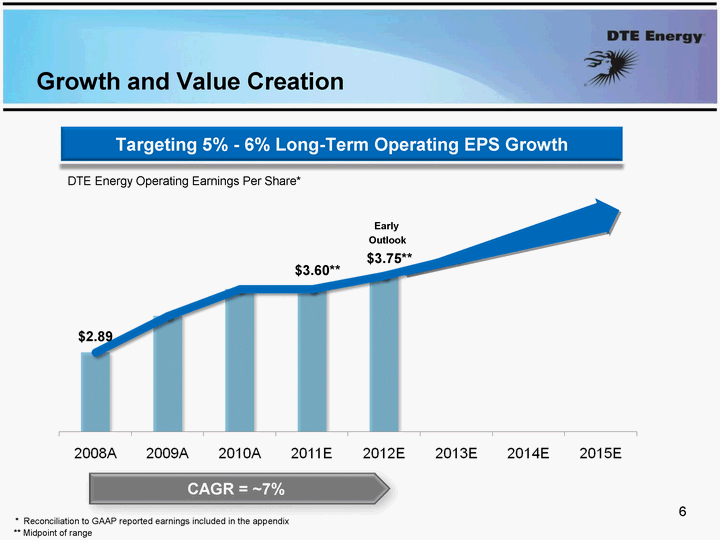
| 6 $2.89 Growth and Value Creation * Reconciliation to GAAP reported earnings included in the appendix $3.60** DTE Energy Operating Earnings Per Share* CAGR = ~7% Targeting 5% - 6% Long-Term Operating EPS Growth ** Midpoint of range $3.75** Early Outlook |
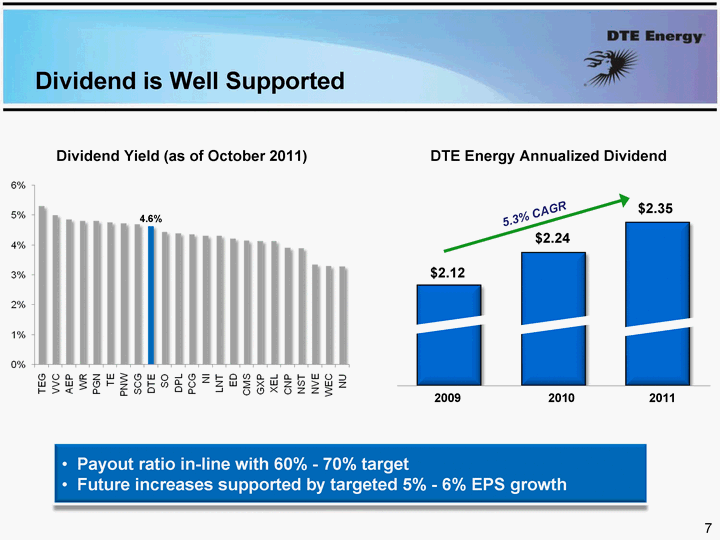
| Dividend is Well Supported 7 Dividend Yield (as of October 2011) 4.6% Payout ratio in-line with 60% - 70% target Future increases supported by targeted 5% - 6% EPS growth DTE Energy Annualized Dividend $2.12 $2.24 2009 $2.35 2010 2011 5.3% CAGR |
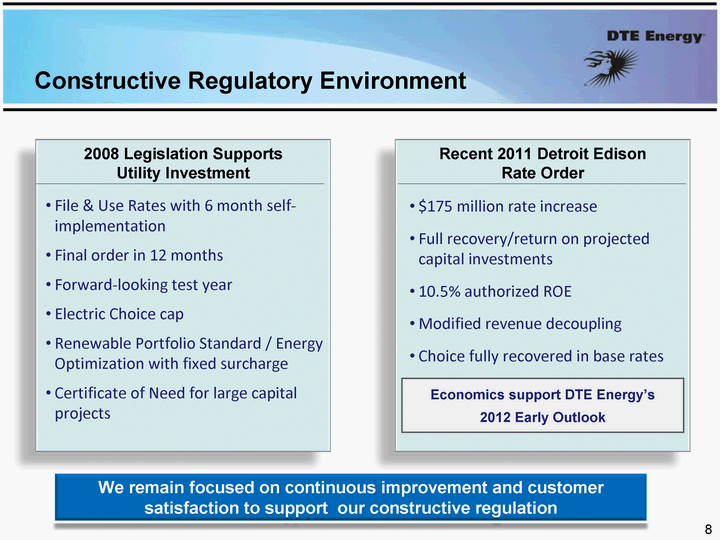
| 2008 Legislation Supports Utility Investment Constructive Regulatory Environment 8 File & Use Rates with 6 month self- implementation Final order in 12 months Forward-looking test year Electric Choice cap Renewable Portfolio Standard / Energy Optimization with fixed surcharge Certificate of Need for large capital projects We remain focused on continuous improvement and customer satisfaction to support our constructive regulation Recent 2011 Detroit Edison Rate Order $175 million rate increase Full recovery/return on projected capital investments 10.5% authorized ROE Modified revenue decoupling Choice fully recovered in base rates Economics support DTE Energy's 2012 Early Outlook |
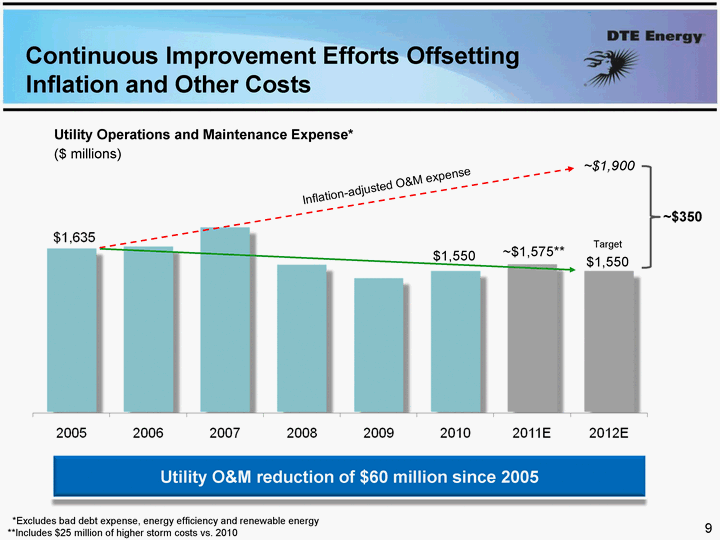
| Continuous Improvement Efforts Offsetting Inflation and Other Costs *Excludes bad debt expense, energy efficiency and renewable energy Utility Operations and Maintenance Expense* ($ millions) ~$1,900 Inflation-adjusted O&M expense ~$1,575** 9 ~$350 Utility O&M reduction of $60 million since 2005 $1,550 **Includes $25 million of higher storm costs vs. 2010 Target $1,550 |
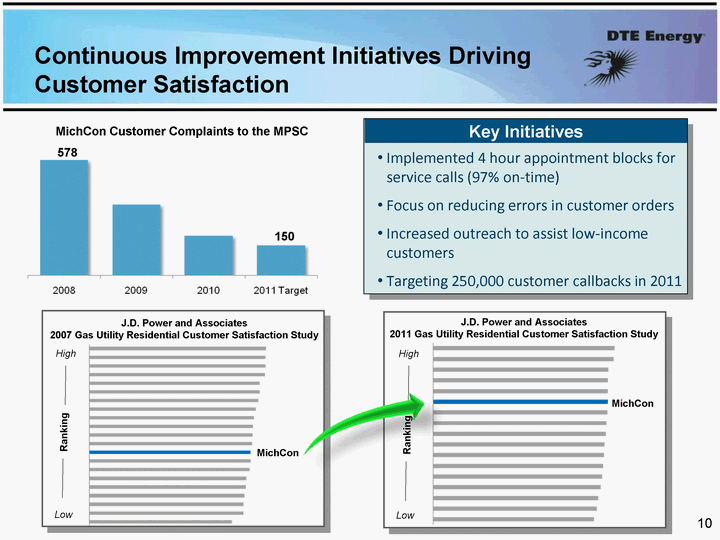
| Continuous Improvement Initiatives Driving Customer Satisfaction MichCon Customer Complaints to the MPSC Implemented 4 hour appointment blocks for service calls (97% on-time) Focus on reducing errors in customer orders Increased outreach to assist low-income customers Targeting 250,000 customer callbacks in 2011 10 578 150 J.D. Power and Associates 2011 Gas Utility Residential Customer Satisfaction Study J.D. Power and Associates 2007 Gas Utility Residential Customer Satisfaction Study MichCon MichCon High Low Low High Ranking Ranking Key Initiatives |
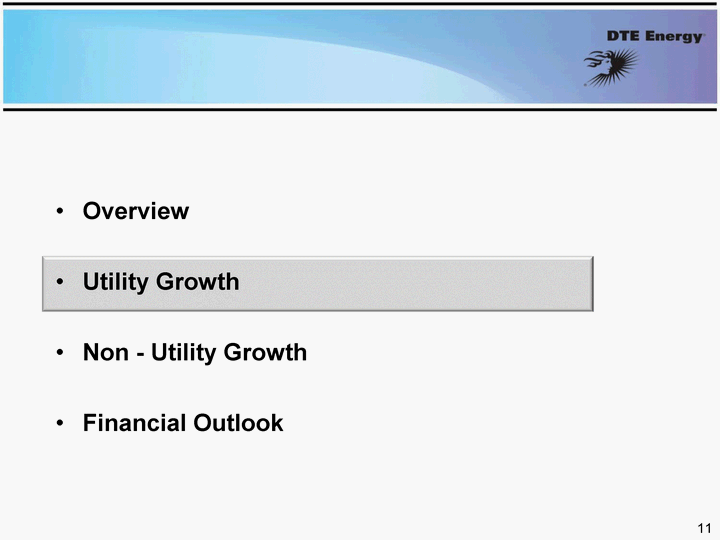
| Overview Utility Growth Non - Utility Growth Financial Outlook 11 |
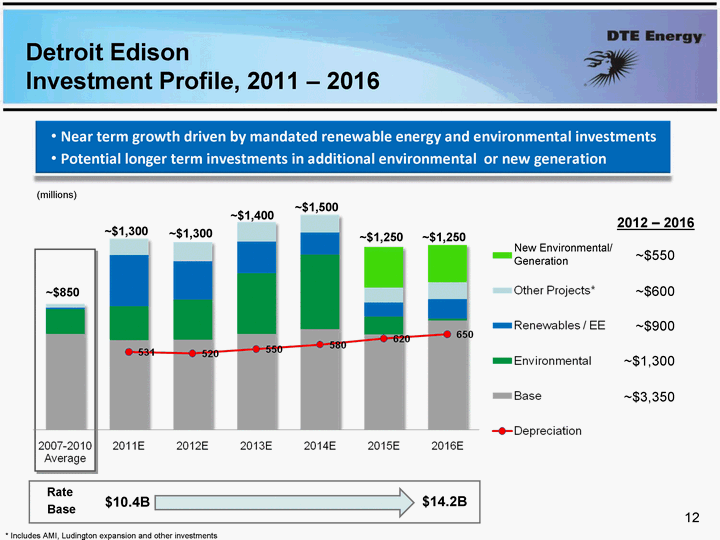
| 12 Rate Base $10.4B $14.2B ~$1,300 ~$1,300 ~$1,400 ~$1,500 ~$1,250 ~$1,250 Detroit Edison Investment Profile, 2011 - 2016 2012 - 2016 ~$600 ~$550 ~$900 ~$1,300 ~$3,350 (millions) Near term growth driven by mandated renewable energy and environmental investments Potential longer term investments in additional environmental or new generation ~$850 * Includes AMI, Ludington expansion and other investments New Environmental/ Generation |
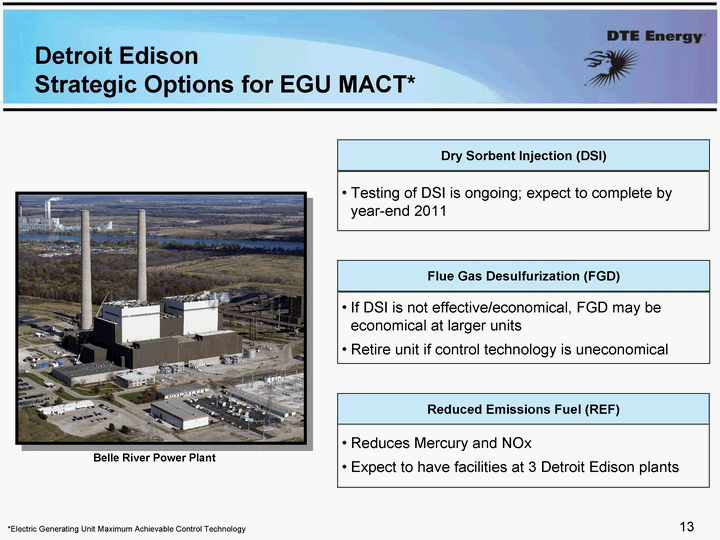
| Detroit Edison Strategic Options for EGU MACT* 13 If DSI is not effective/economical, FGD may be economical at larger units Retire unit if control technology is uneconomical Flue Gas Desulfurization (FGD) Testing of DSI is ongoing; expect to complete by year-end 2011 Dry Sorbent Injection (DSI) Reduces Mercury and NOx Expect to have facilities at 3 Detroit Edison plants Reduced Emissions Fuel (REF) *Electric Generating Unit Maximum Achievable Control Technology Belle River Power Plant |
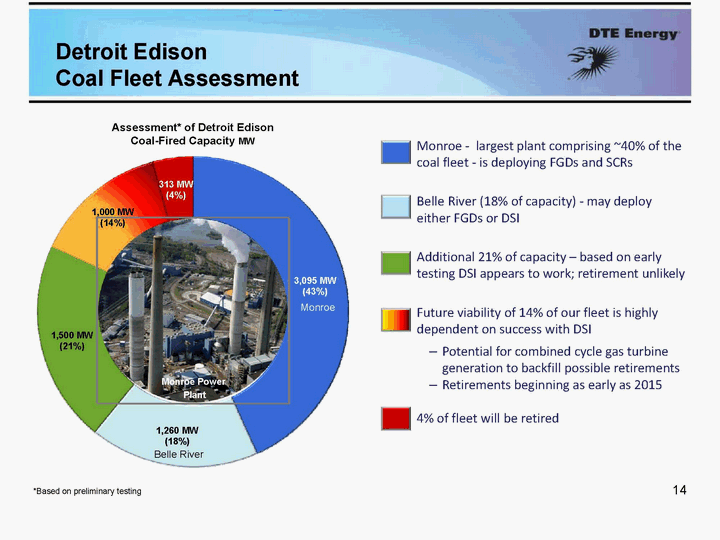
| Detroit Edison Coal Fleet Assessment 14 Assessment* of Detroit Edison Coal-Fired Capacity MW Monroe Monroe - largest plant comprising ~40% of the coal fleet - is deploying FGDs and SCRs Belle River (18% of capacity) - may deploy either FGDs or DSI Additional 21% of capacity - based on early testing DSI appears to work; retirement unlikely Future viability of 14% of our fleet is highly dependent on success with DSI Potential for combined cycle gas turbine generation to backfill possible retirements Retirements beginning as early as 2015 4% of fleet will be retired Monroe Power Plant Belle River *Based on preliminary testing |
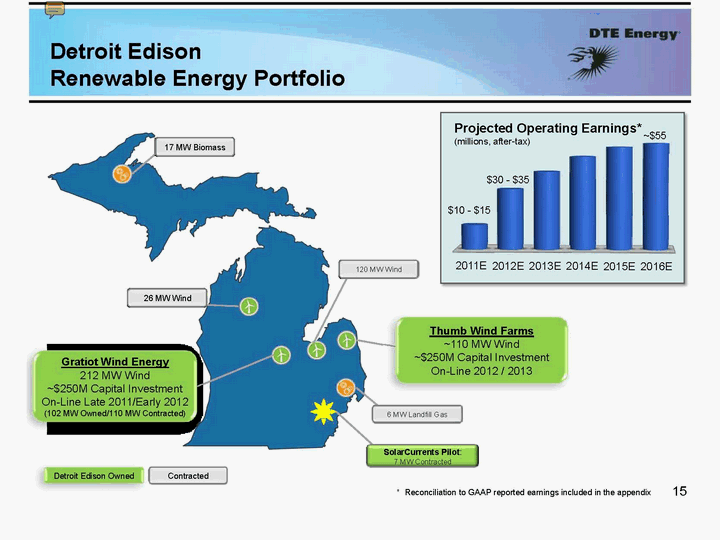
| Detroit Edison Renewable Energy Portfolio 15 17 MW Biomass 26 MW Wind 120 MW Wind 6 MW Landfill Gas SolarCurrents Pilot: 7 MW Contracted Thumb Wind Farms ~110 MW Wind ~$250M Capital Investment On-Line 2012 / 2013 Gratiot Wind Energy 212 MW Wind ~$250M Capital Investment On-Line Late 2011/Early 2012 (102 MW Owned/110 MW Contracted) Detroit Edison Owned Contracted Projected Operating Earnings* (millions, after-tax) $10 - $15 $30 - $35 ~$55 * Reconciliation to GAAP reported earnings included in the appendix |
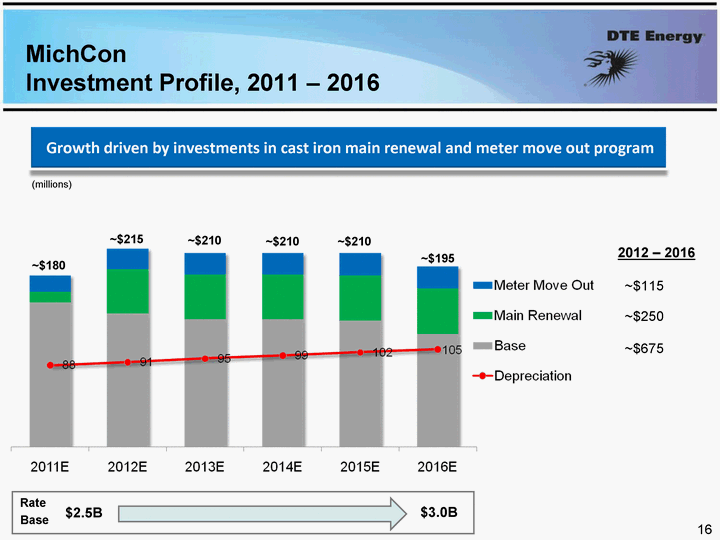
| 16 Rate Base $2.5B $3.0B 2012 - 2016 MichCon Investment Profile, 2011 - 2016 ~$115 ~$250 ~$675 ~$180 ~$215 ~$210 ~$210 ~$210 ~$195 (millions) Growth driven by investments in cast iron main renewal and meter move out program |
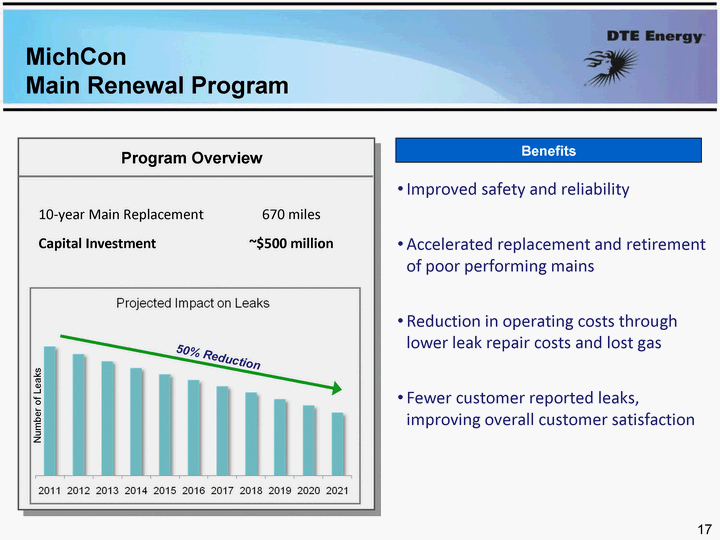
| 17 MichCon Main Renewal Program Improved safety and reliability Accelerated replacement and retirement of poor performing mains Reduction in operating costs through lower leak repair costs and lost gas Fewer customer reported leaks, improving overall customer satisfaction Benefits 10-year Main Replacement 670 miles Capital Investment ~$500 million Program Overview 50% Reduction Number of Leaks |
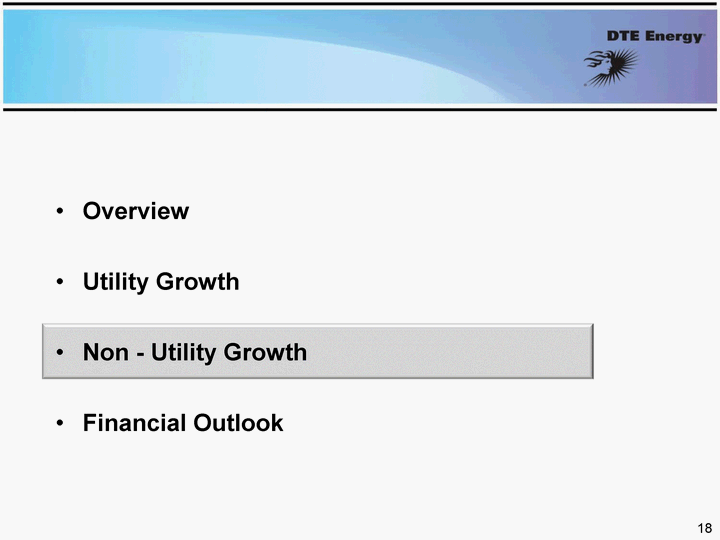
| Overview Utility Growth Non - Utility Growth Financial Outlook 18 |
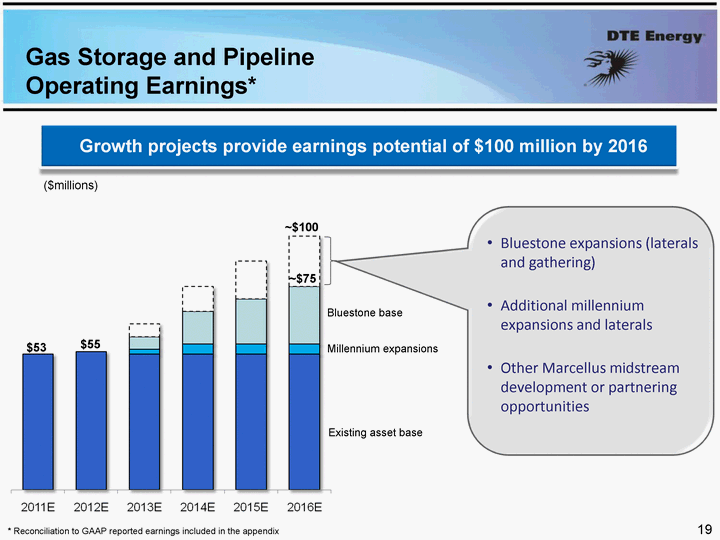
| Gas Storage and Pipeline Operating Earnings* 19 ($millions) Existing asset base Millennium expansions Bluestone base ~$100 Bluestone expansions (laterals and gathering) Additional millennium expansions and laterals Other Marcellus midstream development or partnering opportunities $53 $55 * Reconciliation to GAAP reported earnings included in the appendix Growth projects provide earnings potential of $100 million by 2016 ~$75 |
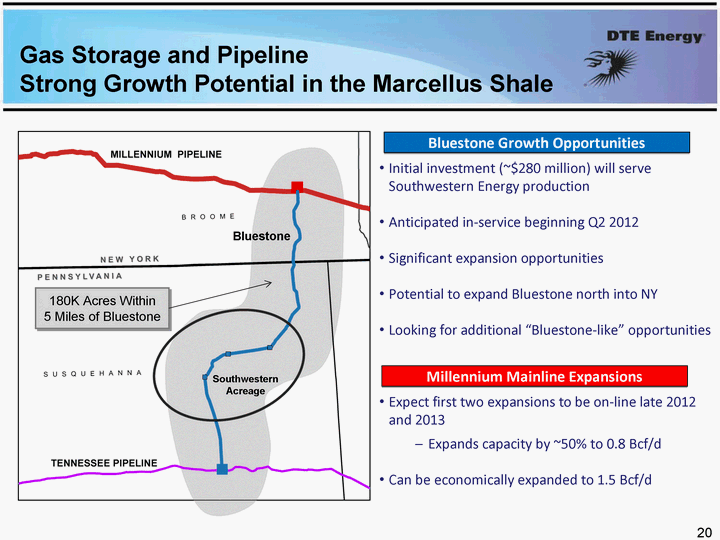
| Gas Storage and Pipeline Strong Growth Potential in the Marcellus Shale 20 Bluestone Southwestern Acreage 180K Acres Within 5 Miles of Bluestone Initial investment (~$280 million) will serve Southwestern Energy production Anticipated in-service beginning Q2 2012 Significant expansion opportunities Potential to expand Bluestone north into NY Looking for additional "Bluestone-like" opportunities Expect first two expansions to be on-line late 2012 and 2013 Expands capacity by ~50% to 0.8 Bcf/d Can be economically expanded to 1.5 Bcf/d Bluestone Growth Opportunities Millennium Mainline Expansions |
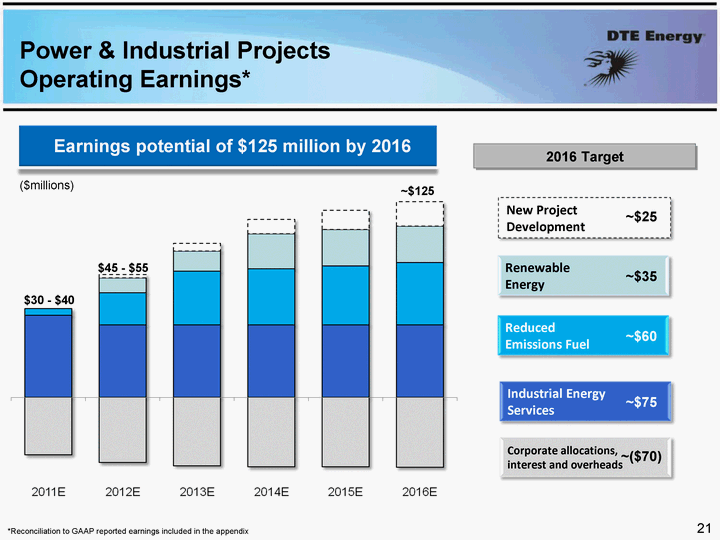
| *Reconciliation to GAAP reported earnings included in the appendix Power & Industrial Projects Operating Earnings* 21 $30 - $40 ~$125 Renewable Energy Reduced Emissions Fuel Industrial Energy Services $45 - $55 New Project Development Earnings potential of $125 million by 2016 ($millions) 2016 Target ~$25 ~$35 ~$60 ~$75 Corporate allocations, interest and overheads ~($70) |
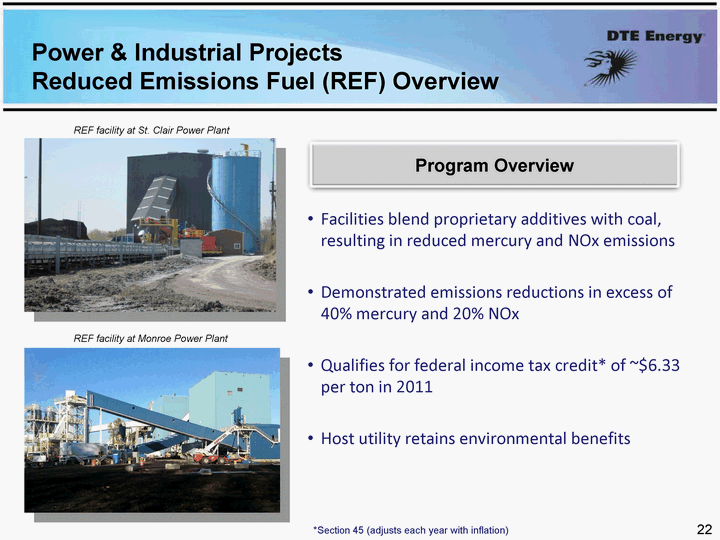
| 22 Facilities blend proprietary additives with coal, resulting in reduced mercury and NOx emissions Demonstrated emissions reductions in excess of 40% mercury and 20% NOx Qualifies for federal income tax credit* of ~$6.33 per ton in 2011 Host utility retains environmental benefits Program Overview REF facility at St. Clair Power Plant Power & Industrial Projects Reduced Emissions Fuel (REF) Overview *Section 45 (adjusts each year with inflation) REF facility at Monroe Power Plant |
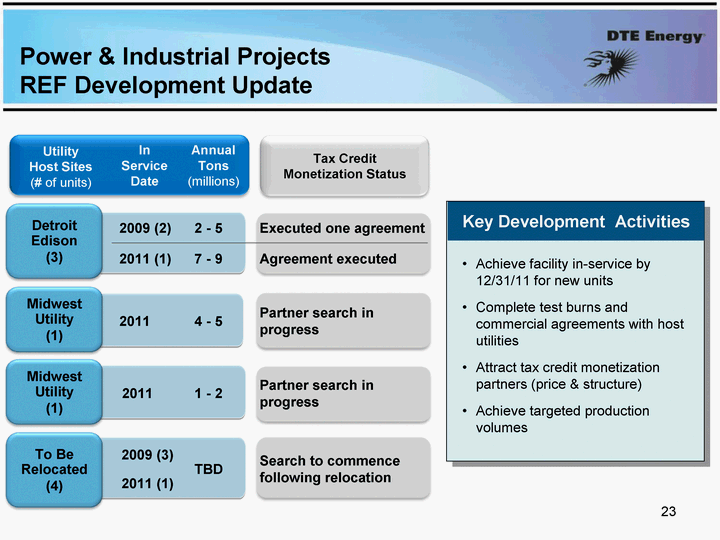
| Executed one agreement Agreement executed 23 Detroit Edison (3) Midwest Utility (1) Midwest Utility (1) 2009 (2) 2011 (1) 2 - 5 7 - 9 2011 4 - 5 Partner search in progress 2011 1 - 2 Partner search in progress 2009 (3) 2011 (1) TBD Search to commence following relocation Utility Host Sites (# of units) In Service Date Annual Tons (millions) Monetization Partnership Status Key Development Activities Achieve facility in-service by 12/31/11 for new units Complete test burns and commercial agreements with host utilities Attract tax credit monetization partners (price & structure) Achieve targeted production volumes Power & Industrial Projects REF Development Update To Be Relocated (4) Tax Credit Monetization Status |
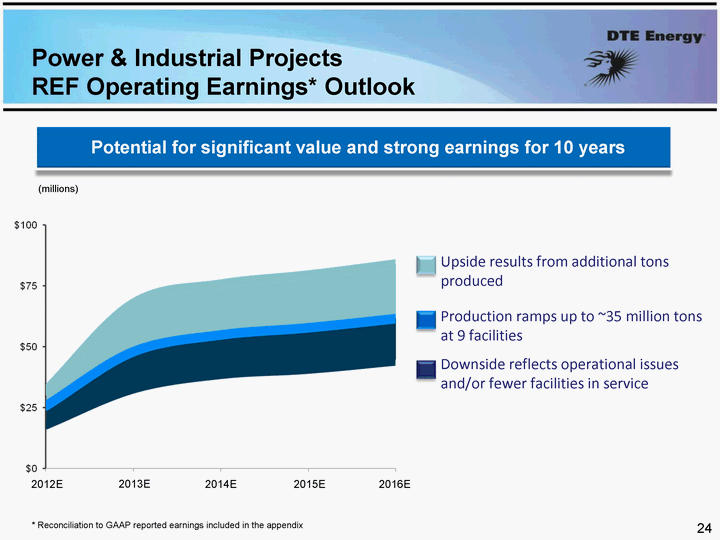
| Production ramps up to ~35 million tons at 9 facilities Upside results from additional tons produced Downside reflects operational issues and/or fewer facilities in service 24 Power & Industrial Projects REF Operating Earnings* Outlook Potential for significant value and strong earnings for 10 years (millions) * Reconciliation to GAAP reported earnings included in the appendix 2012E 2013E 2014E 2015E 2016E |
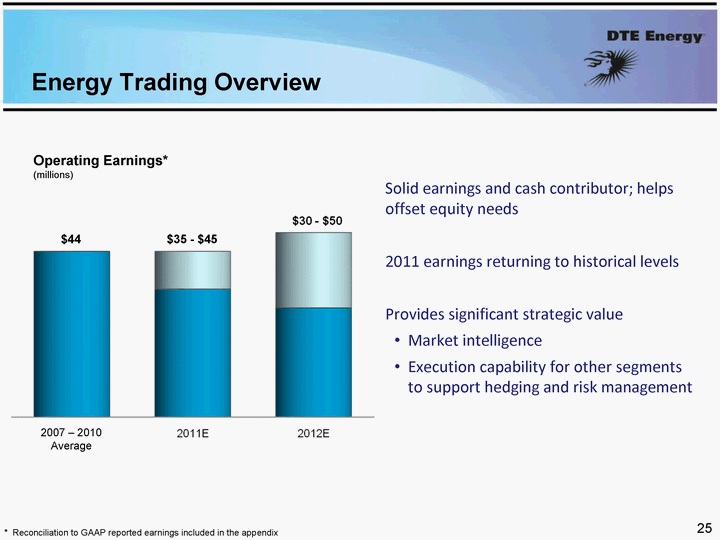
| Energy Trading Overview 25 * Reconciliation to GAAP reported earnings included in the appendix Operating Earnings* (millions) $44 $35 - $45 Solid earnings and cash contributor; helps offset equity needs 2011 earnings returning to historical levels Provides significant strategic value Market intelligence Execution capability for other segments to support hedging and risk management 2007 - 2010 Average |
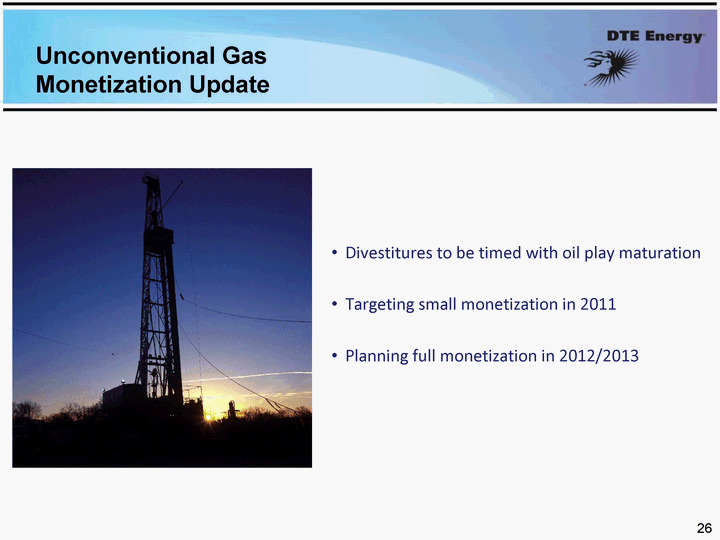
| Unconventional Gas Monetization Update Divestitures to be timed with oil play maturation Targeting small monetization in 2011 Planning full monetization in 2012/2013 26 |
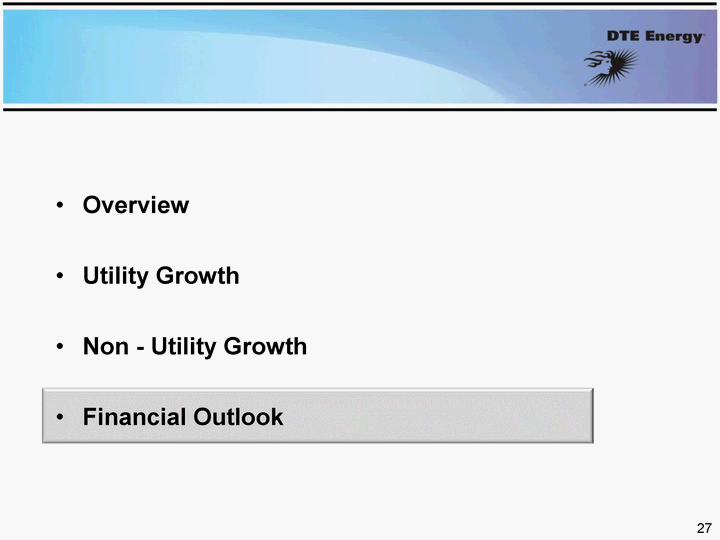
| Overview Utility Growth Non - Utility Growth Financial Outlook 27 |
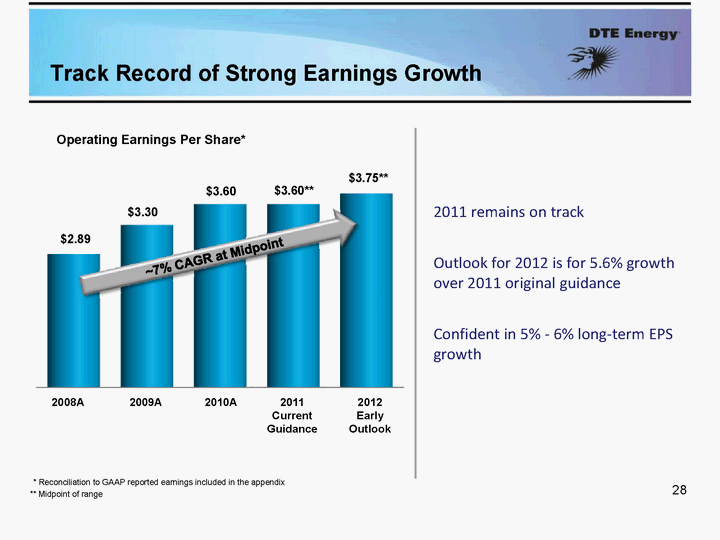
| Track Record of Strong Earnings Growth 28 $2.89 $3.30 $3.60** Operating Earnings Per Share* 2008A 2009A 2010A 2011 Current Guidance 2012 Early Outlook $3.60 $3.75** 2011 remains on track Outlook for 2012 is for 5.6% growth over 2011 original guidance Confident in 5% - 6% long-term EPS growth * Reconciliation to GAAP reported earnings included in the appendix ~7% CAGR at Midpoint ** Midpoint of range |
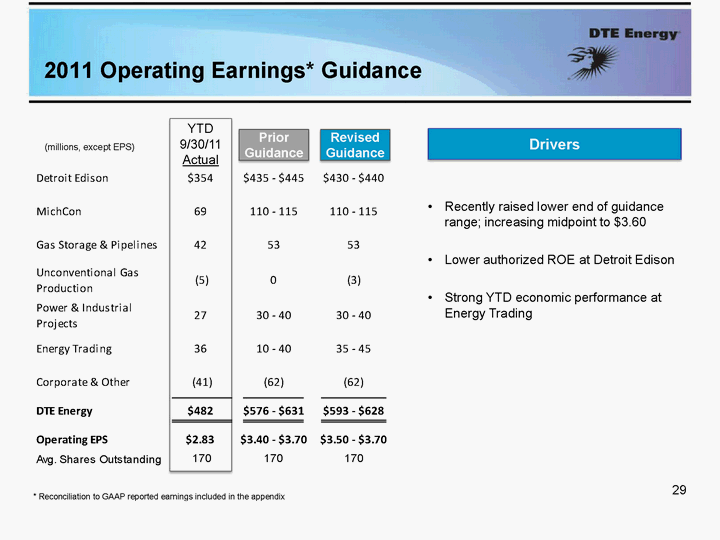
| YTD 9/30/11 Actual 29 2011 Operating Earnings* Guidance (millions, except EPS) Prior Guidanc e * Reconciliation to GAAP reported earnings included in the appendix Revised Guidanc e Drivers Recently raised lower end of guidance range; increasing midpoint to $3.60 Lower authorized ROE at Detroit Edison Strong YTD economic performance at Energy Trading |
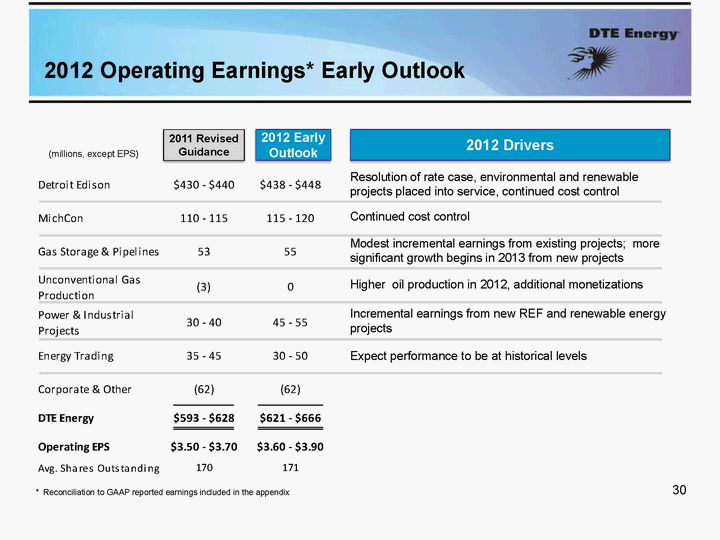
| 2012 Operating Earnings* Early Outlook 2012 Drivers * Reconciliation to GAAP reported earnings included in the appendix 2012 Early Outlook 2011 Revised Guidance 30 (millions, except EPS) Resolution of rate case, environmental and renewable projects placed into service, continued cost control Modest incremental earnings from existing projects; more significant growth begins in 2013 from new projects Incremental earnings from new REF and renewable energy projects Continued cost control Higher oil production in 2012, additional monetizations Expect performance to be at historical levels |
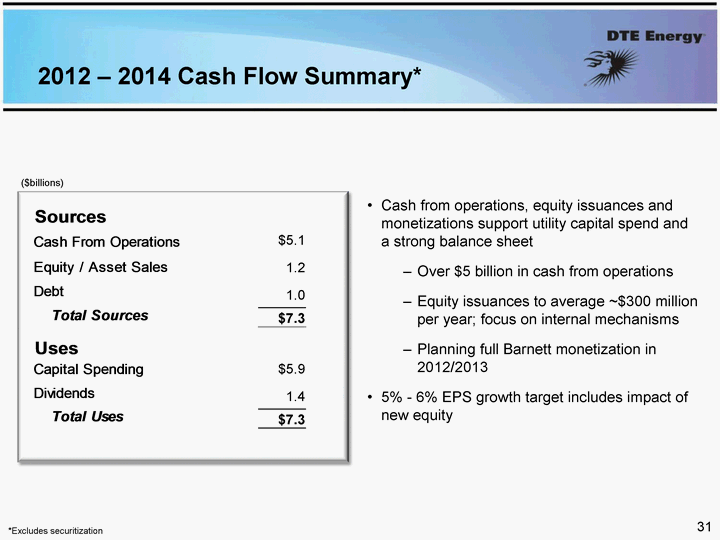
| 2012 - 2014 Cash Flow Summary* 31 Cash from operations, equity issuances and monetizations support utility capital spend and a strong balance sheet Over $5 billion in cash from operations Equity issuances to average ~$300 million per year; focus on internal mechanisms Planning full Barnett monetization in 2012/2013 5% - 6% EPS growth target includes impact of new equity $5.1 1.2 1.0 $7.3 $5.9 1.4 $7.3 ($billions) *Excludes securitization |
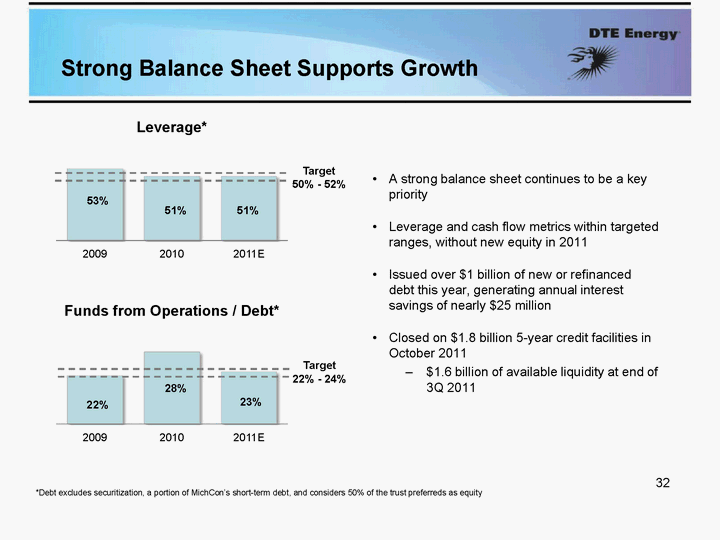
| 32 *Debt excludes securitization, a portion of MichCon's short-term debt, and considers 50% of the trust preferreds as equity A strong balance sheet continues to be a key priority Leverage and cash flow metrics within targeted ranges, without new equity in 2011 Issued over $1 billion of new or refinanced debt this year, generating annual interest savings of nearly $25 million Closed on $1.8 billion 5-year credit facilities in October 2011 $1.6 billion of available liquidity at end of 3Q 2011 Leverage* Funds from Operations / Debt* 51% 51% Target 50% - 52% 28% 23% Target 22% - 24% 53% 22% Strong Balance Sheet Supports Growth |
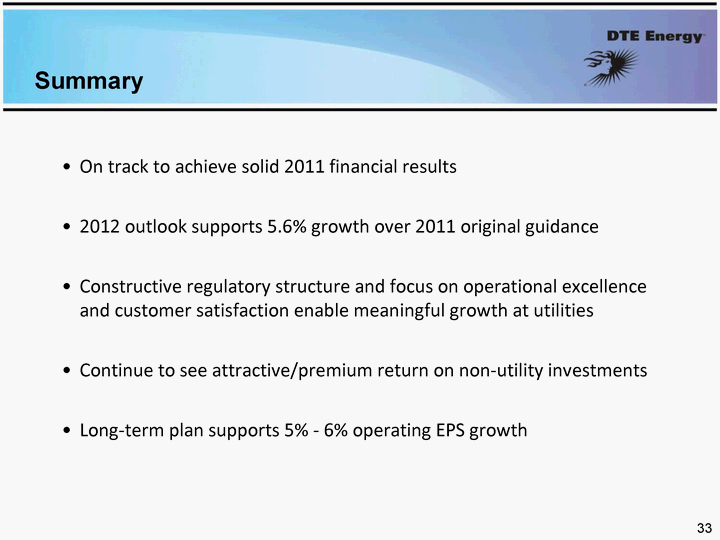
| Summary 33 On track to achieve solid 2011 financial results 2012 outlook supports 5.6% growth over 2011 original guidance Constructive regulatory structure and focus on operational excellence and customer satisfaction enable meaningful growth at utilities Continue to see attractive/premium return on non-utility investments Long-term plan supports 5% - 6% operating EPS growth |
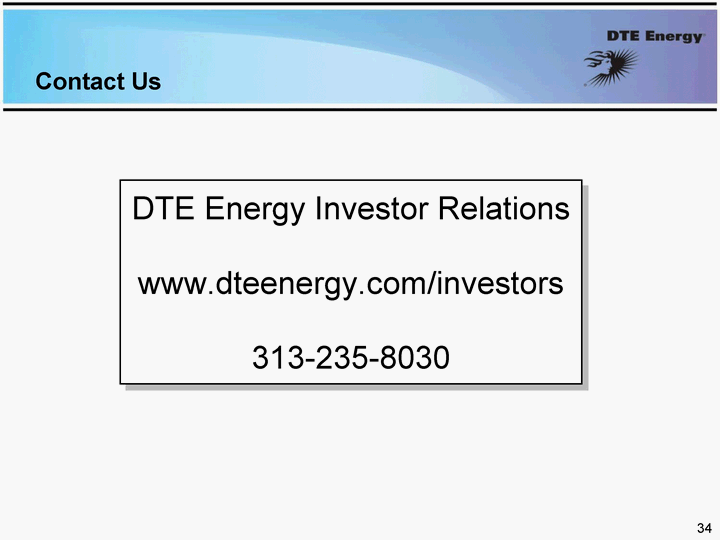
| Contact Us DTE Energy Investor Relations www.dteenergy.com/investors 313-235-8030 34 |
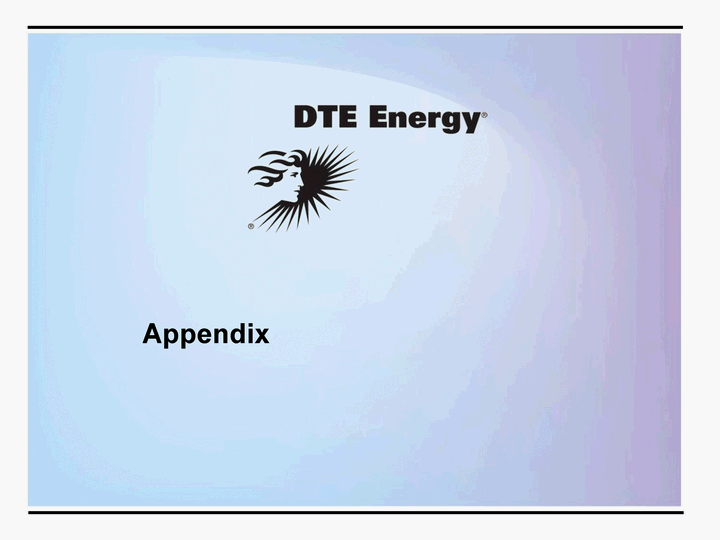
| Appendix |
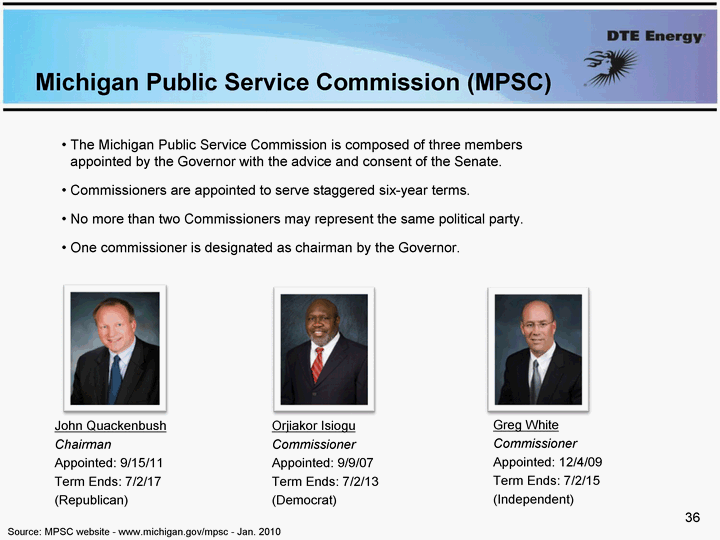
| Orjiakor Isiogu Commissioner Appointed: 9/9/07 Term Ends: 7/2/13 (Democrat) Greg White Commissioner Appointed: 12/4/09 Term Ends: 7/2/15 (Independent) Source: MPSC website - www.michigan.gov/mpsc - Jan. 2010 The Michigan Public Service Commission is composed of three members appointed by the Governor with the advice and consent of the Senate. Commissioners are appointed to serve staggered six-year terms. No more than two Commissioners may represent the same political party. One commissioner is designated as chairman by the Governor. 36 Michigan Public Service Commission (MPSC) John Quackenbush Chairman Appointed: 9/15/11 Term Ends: 7/2/17 (Republican) |
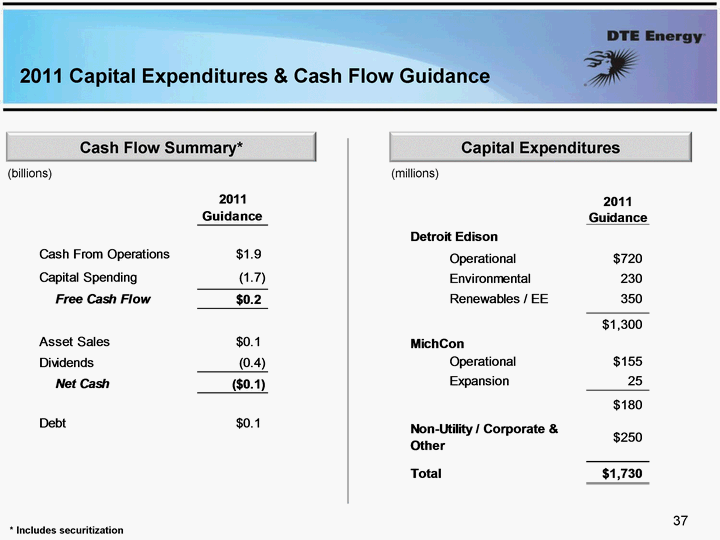
| 37 2011 Capital Expenditures & Cash Flow Guidance Capital Expenditures (millions) Cash Flow Summary* (billions) * Includes securitization |
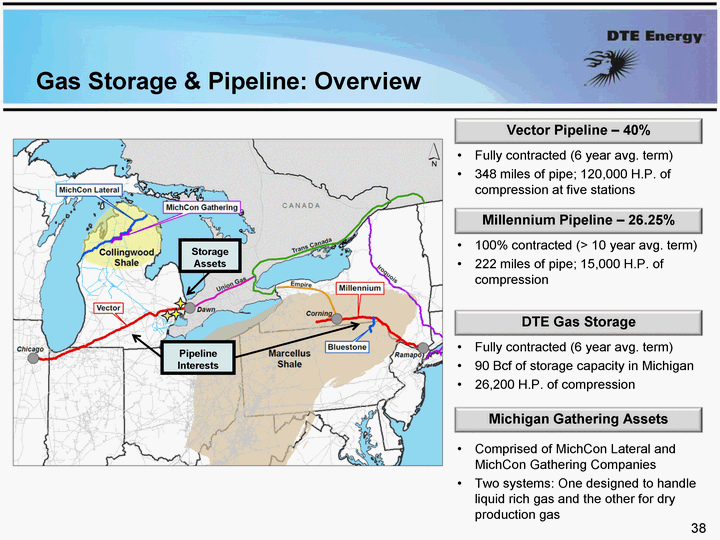
| Gas Storage & Pipeline: Overview Storage Assets Pipeline Interests 38 Fully contracted (6 year avg. term) 90 Bcf of storage capacity in Michigan 26,200 H.P. of compression 100% contracted (> 10 year avg. term) 222 miles of pipe; 15,000 H.P. of compression Fully contracted (6 year avg. term) 348 miles of pipe; 120,000 H.P. of compression at five stations Vector Pipeline - 40% Millennium Pipeline - 26.25% DTE Gas Storage Michigan Gathering Assets Comprised of MichCon Lateral and MichCon Gathering Companies Two systems: One designed to handle liquid rich gas and the other for dry production gas |
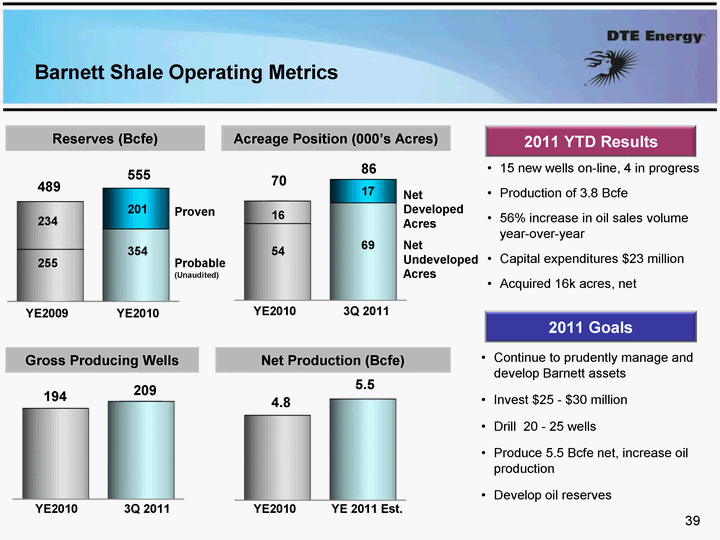
| Net Production (Bcfe) Gross Producing Wells 209 Reserves (Bcfe) Acreage Position (000's Acres) Net Undeveloped Acres Net Developed Acres Barnett Shale Operating Metrics 17 3Q 2011 69 86 16 54 YE2010 70 3Q 2011 YE2010 194 5.5 YE2010 4.8 YE2010 YE2009 Probable (Unaudited) Proven 354 201 555 255 234 489 Continue to prudently manage and develop Barnett assets Invest $25 - $30 million Drill 20 - 25 wells Produce 5.5 Bcfe net, increase oil production Develop oil reserves 15 new wells on-line, 4 in progress Production of 3.8 Bcfe 56% increase in oil sales volume year-over-year Capital expenditures $23 million Acquired 16k acres, net 2011 YTD Results 2011 Goals YE 2011 Est. 39 |
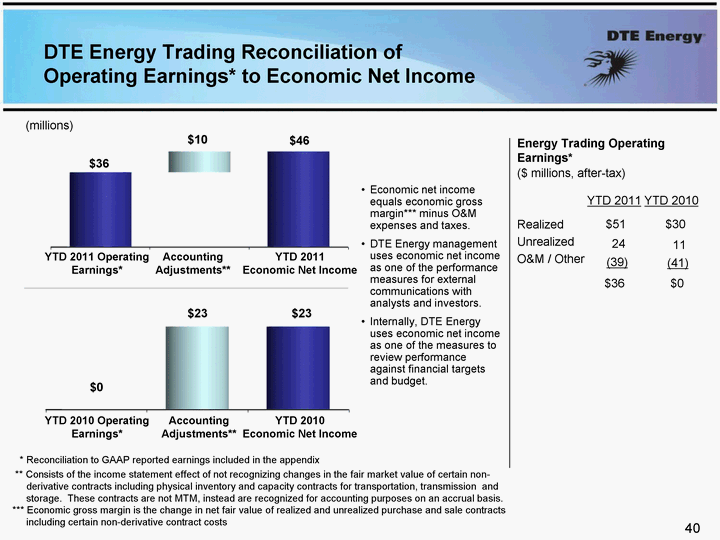
| DTE Energy Trading Reconciliation of Operating Earnings* to Economic Net Income ** Consists of the income statement effect of not recognizing changes in the fair market value of certain non- derivative contracts including physical inventory and capacity contracts for transportation, transmission and storage. These contracts are not MTM, instead are recognized for accounting purposes on an accrual basis. (millions) YTD 2011 Economic Net Income Accounting Adjustments** YTD 2011 Operating Earnings* $10 $46 Economic net income equals economic gross margin*** minus O&M expenses and taxes. DTE Energy management uses economic net income as one of the performance measures for external communications with analysts and investors. Internally, DTE Energy uses economic net income as one of the measures to review performance against financial targets and budget. * Reconciliation to GAAP reported earnings included in the appendix *** Economic gross margin is the change in net fair value of realized and unrealized purchase and sale contracts including certain non-derivative contract costs Energy Trading Operating Earnings* Realized Unrealized O&M / Other YTD 2010 YTD 2011 $30 $51 24 11 (41) (39) ($ millions, after-tax) $0 $36 $0 $23 $23 YTD 2010 Operating Earnings* YTD 2010 Economic Net Income Accounting Adjustments** 40 $36 |
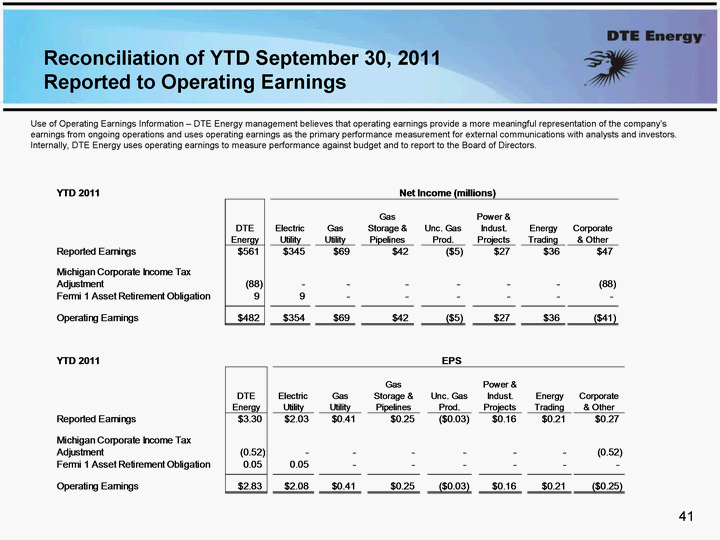
| 41 Use of Operating Earnings Information - DTE Energy management believes that operating earnings provide a more meaningful representation of the company's earnings from ongoing operations and uses operating earnings as the primary performance measurement for external communications with analysts and investors. Internally, DTE Energy uses operating earnings to measure performance against budget and to report to the Board of Directors. Reconciliation of YTD September 30, 2011 Reported to Operating Earnings |
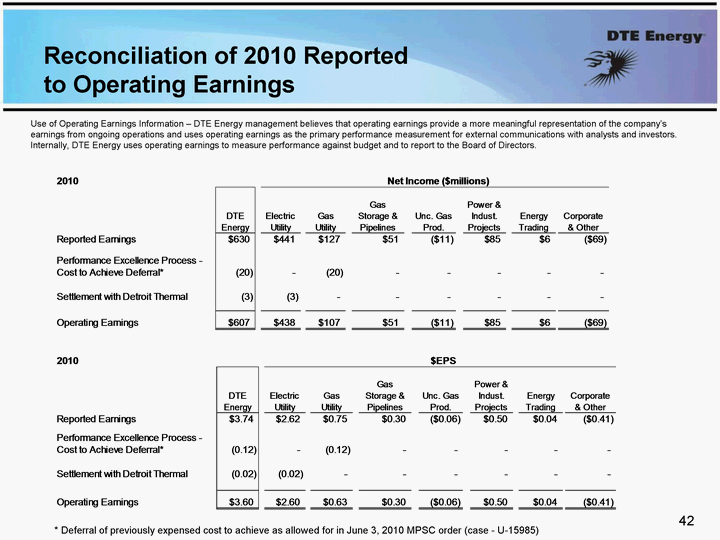
| 42 Use of Operating Earnings Information - DTE Energy management believes that operating earnings provide a more meaningful representation of the company's earnings from ongoing operations and uses operating earnings as the primary performance measurement for external communications with analysts and investors. Internally, DTE Energy uses operating earnings to measure performance against budget and to report to the Board of Directors. Reconciliation of 2010 Reported to Operating Earnings * Deferral of previously expensed cost to achieve as allowed for in June 3, 2010 MPSC order (case - U-15985) |
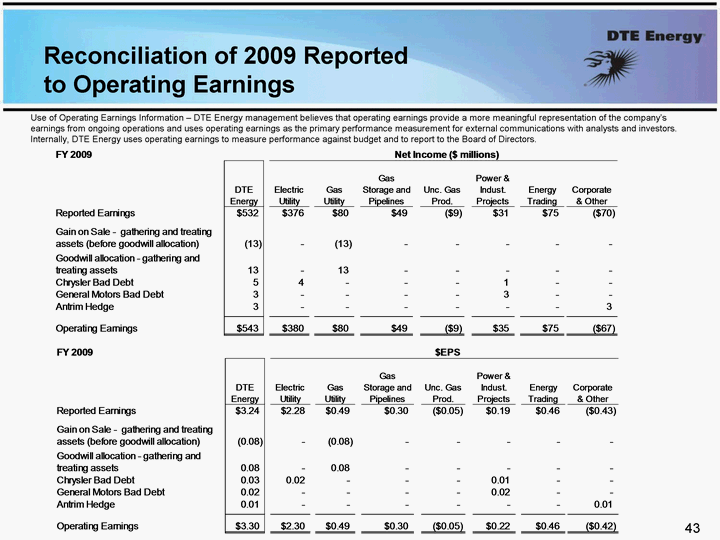
| Reconciliation of 2009 Reported to Operating Earnings Use of Operating Earnings Information - DTE Energy management believes that operating earnings provide a more meaningful representation of the company's earnings from ongoing operations and uses operating earnings as the primary performance measurement for external communications with analysts and investors. Internally, DTE Energy uses operating earnings to measure performance against budget and to report to the Board of Directors. 43 |
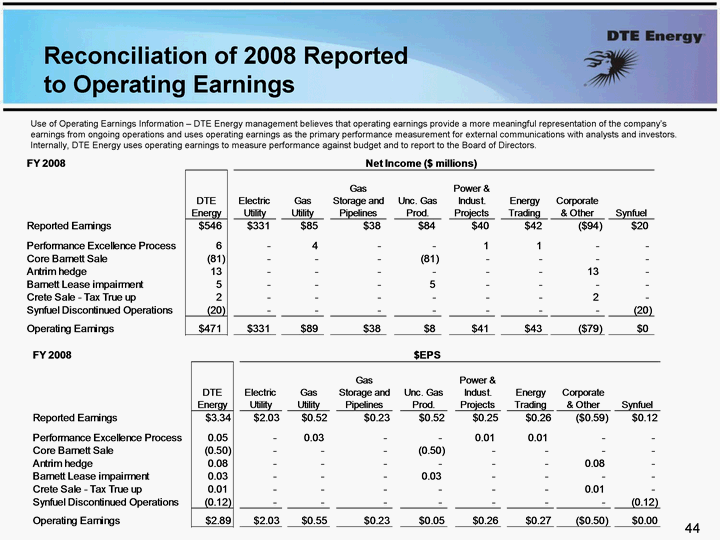
| Reconciliation of 2008 Reported to Operating Earnings Use of Operating Earnings Information - DTE Energy management believes that operating earnings provide a more meaningful representation of the company's earnings from ongoing operations and uses operating earnings as the primary performance measurement for external communications with analysts and investors. Internally, DTE Energy uses operating earnings to measure performance against budget and to report to the Board of Directors. 44 |
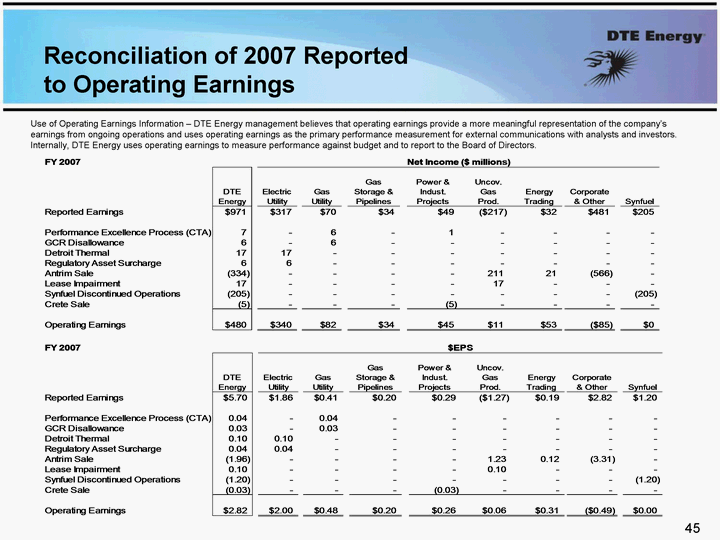
| Reconciliation of 2007 Reported to Operating Earnings Use of Operating Earnings Information - DTE Energy management believes that operating earnings provide a more meaningful representation of the company's earnings from ongoing operations and uses operating earnings as the primary performance measurement for external communications with analysts and investors. Internally, DTE Energy uses operating earnings to measure performance against budget and to report to the Board of Directors. 45 |
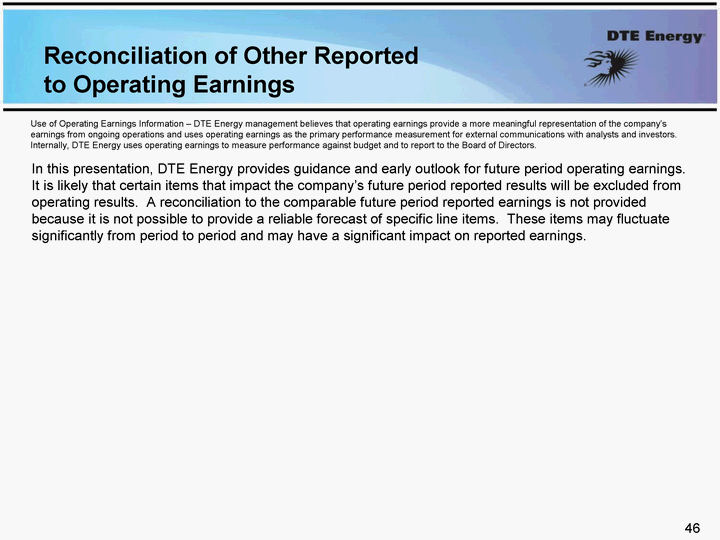
| Reconciliation of Other Reported to Operating Earnings Use of Operating Earnings Information - DTE Energy management believes that operating earnings provide a more meaningful representation of the company's earnings from ongoing operations and uses operating earnings as the primary performance measurement for external communications with analysts and investors. Internally, DTE Energy uses operating earnings to measure performance against budget and to report to the Board of Directors. In this presentation, DTE Energy provides guidance and early outlook for future period operating earnings. It is likely that certain items that impact the company's future period reported results will be excluded from operating results. A reconciliation to the comparable future period reported earnings is not provided because it is not possible to provide a reliable forecast of specific line items. These items may fluctuate significantly from period to period and may have a significant impact on reported earnings. 46 |
